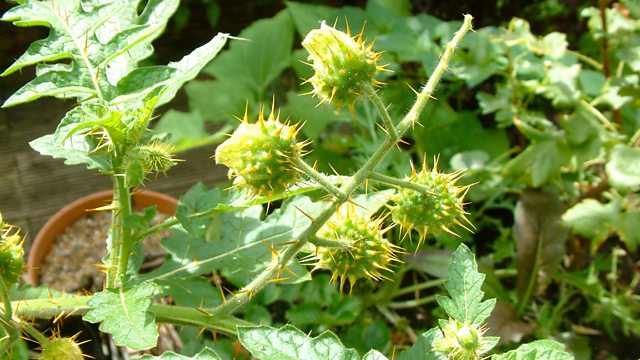Eccles
Eric Robson hosts the horticultural panel programme from Eccles. Chris Beardshaw, Pippa Greenwood and Bunny Guinness answer the audience's queries.
Eric Robson hosts the horticultural panel programme from Eccles. Taking the audience's questions are Chris Beardshaw, Pippa Greenwood and Bunny Guinness.
Would you be brave enough to consider entering your local flower and vegetable show? Matt Biggs meets one gardener in Nottinghamshire who has risen to the challenge.
Produced by Howard Shannon.
Assistant Producer: Darby Dorras.
A Somethin' Else Production for Βι¶ΉΤΌΕΔ Radio 4.
Q. What would the panel recommend to create a low maintenance garden in quite a cold climate with low soil density?
A. Lilac does very well in free draining soil. Also try Helleborus orientalis or a variety of Fern. You need to introduce more organic matter, so it might be worth creating a community composting system. Buddleia is the ultimate low maintenance plant or some of the Hypericums would work. Increase the number of bulbs and in some of the sunnier spots try summer-flowering bulbs such as Nyrenes.
Q. Could the panel give some advice on how to grow Asphodel?
A. Asphodel is a member of the Lily family and is typically found in South-East Europe. It has a rosette of grey leaves forming an almost onion-like shape. From this grows a spike of up to 1m (3ft) in height. The yellow form is Asphodelus luteus. There are white forms with a single spike, such as Asphodel Albus or branching Ramosus. It will need free-draining soil-based compost in a container. Make sure it does not get too wet or cold in the winter. It also requires plenty of sunshine and reduced fertility. Asphodel is easier to grow from a herbaceous perennial rather than a bulb.
Q. Could the panel suggest some plants and seeds that will produce edible flowers in the Manchester climate?
A. Pansies, Violets and Marigolds can all be eaten and add a lot of colour. Also try allowing Chives and Garlic Chives to flower into their purple pompoms. The blue flowers of the Rosemary have a surprising flavour. Wasabi has small white flowers and can be grown in a pot and saucer. Wasabi roots can only be harvested after the second year, but the leaves and flowers are very easy to grow. The pot Marigold, Calendula, adds a vibrant shade to any salad. Borage will crop up everywhere and the blue flowers have a slight cucumber taste. Roses, such as Rosa Glauca and Rosa Rugosa, provide wonderful petals.
Q. Is it possible to over scarify a lawn?
A. It is done to remove any detritus that may be sitting on the surface of the soil, to prevent thatch developing, and to encourage finer foliage. The lawn can take a long time to recover from a heavy job. It also depends on the soil type and more damage can be done to a light soil. If you want a manicured lawn then it is necessary, but you could just use a mulch mower for a more natural look. If you think you have over-scarified then you can add a top layer of soil mixed with fine compost and grass seed.
Q. I am a beekeeper on an urban allotment and am in the process of planting wild plants in area previously inundated with Couch Grass and a mass of unidentified weeds. Could the panel recommend colourful, nectar-rich flowers to plant for early summer?
A. The annual Lavatera has a broad open flower making it good for bees. Yellow Rattle is highly recommended if you are looking to reduce the vigour of grass and improve the opportunity for subsequent crops. It is a parasitic plant which will lead to a dramatic reduction in the speed of the grass growth, opening up the opportunity for more wild flowers to grow. However, the soil will need to have a low fertility for it to thrive. The Ground Elder you already have on site will actually produce lovely white flowers.
Outlawed plants added to Section 9 of the Wildlife and Countryside Act: Water Fern, Parrot's Feather, Floating Pennywort, Water Primrose and Australian Swamp Stonecrop.
Last on
More episodes
Previous
Next
Broadcast
- Sun 20 Apr 2014 14:00Βι¶ΉΤΌΕΔ Radio 4
Six of GQT’s naughtiest gardening innuendos
When Gardeners' Question Time got mucky.
Podcast
-
![]()
Gardeners' Question Time
Horticultural programme featuring a group of gardening experts


